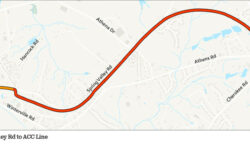The state government restored the last of the Great Recession-era austerity cuts for public schools this year, allowing the Clarke County School District to reduce class sizes, but local school officials are hoping for even more help during the 2019 legislative session, which starts in January.
On the campaign trail, Gov.-elect Brian Kemp promised to give teachers $5,000 raises. Both of Athens’ state senators, Bill Cowsert and Frank Ginn, said during a meeting with CCSD’s government relations committee that they expect Kemp to keep his word, although it remains to be seen if budget writers in the legislature will agree.
Even if the raise does come through, it will bring up equity issues local school districts will have to grapple with, according to Claire Suggs, chief of community engagement and strategic partnerships. For example, about 100 CCSD teachers aren’t covered under Quality Basic Education, the state funding formula, so the district would have to spend $1.4 million in local property-tax revenue to extend raises and benefits to those teachers, Suggs said. And that doesn’t even count central office staff, parapros, bus drivers, cafeteria workers or custodians.
Rising health-care costs and contributions to the Teacher Retirement System are growing burdens as well, Chief Financial Officer Larry Hammel said. Board members Greg Davis and Charles Worthy underscored the importance of TRS, saying generous retirement benefits draw teachers to Georgia despite subpar pay and could help alleviate a teacher shortage if it’s shored up.
CCSD staff and school board members also asked legislators to tie QBE to inflation and insert something into the formula that takes poverty into account. In response, Cowsert asked what should be cut. “It’s a big ask,” he said, noting that past efforts to “modernize” QBE have ended in stalemates. “It’s a heavy lift.”
Ginn had questions about why so many CCSD students—8.7 percent—are classified as special needs. (The answer was that rural districts don’t provide enough services, so parents of special-needs students move to Clarke County.)
When the conversation turned to lack of funding for early learning, Ginn said that’s an issue Kemp is focused on. Cowsert said he’s likely to reintroduce a bill requiring the state lottery, which funds pre-K and the HOPE Scholarship, to pay more into state coffers and less to lottery winners. If the state’s share grew from the current 25 percent to the 35 percent required by law, it would generate an additional $400 million, he said. Past versions of the bill have passed the Senate but died in the House, because lottery officials argue that reducing jackpots will result in fewer tickets sold.
Reps.-elect Marcus Wiedower (R-Watkinsville) and Houston Gaines (R-Athens) and Rep. Spencer Frye (D-Athens) also attended.
Like what you just read? Support Flagpole by making a donation today. Every dollar you give helps fund our ongoing mission to provide Athens with quality, independent journalism.









